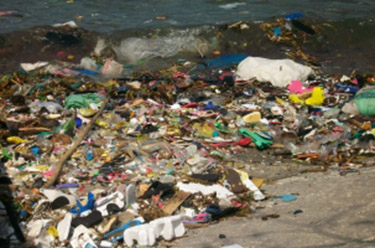Recycling Plastic Waste from the Water

Waterproof Media is a young company that is looking for innovative solutions to make the world a bit of a better place. One thing they are looking at is new applications for waste plastic found in the water.
The company asked the Natural Capital Help Desk to figure out the amount and composition of waste plastic along the coast and in inland waters. They also wanted to know about the current processing practices and recycling initiatives in this area.
Fishnets, plastic bags and bottles
The only known numbers come from clean-up actions carried out by private agencies and volunteers, which mainly count the number of pieces of plastic found. There is not much known about the composition of plastic litter. From a couple of scientific and private research reports it appears that fish nets and lines are what is most often found in the sea and along the coast, and that plastic bags and unidentifiable pieces of plastic are also found there. In urban and river areas, people find mostly bigger unidentifiable pieces of plastic and lots of plastic bottles.
Barriers to recycling
Government agencies do not yet see the collected plastic waste as a valuable resource for new products. Barriers to recycling plastic waste from the water include contamination, shredding and legal restrictions. The mixture of plastics and other materials makes it almost impossible to split the plastic per type after it is collected and to recycle it on a large scale.
Recycling initiatives and ideas
Despite the barriers, there are initiatives that recycle specific sorts of waste. These initiatives are mostly aimed at plastic bottles and fishnets because these types of waste are easily recognizable and recyclable. Bottles become sheet material for boats and the base material for thread. Fishing nets become bracelets, carpet tiles, swimsuits and socks. There are also broader initiatives being developed, such as the processing of plastic from the Nieuwe Maas into floating blocks to be used as a base for a nature reserve on the water in Rotterdam.
More info: Wijnand Broer

